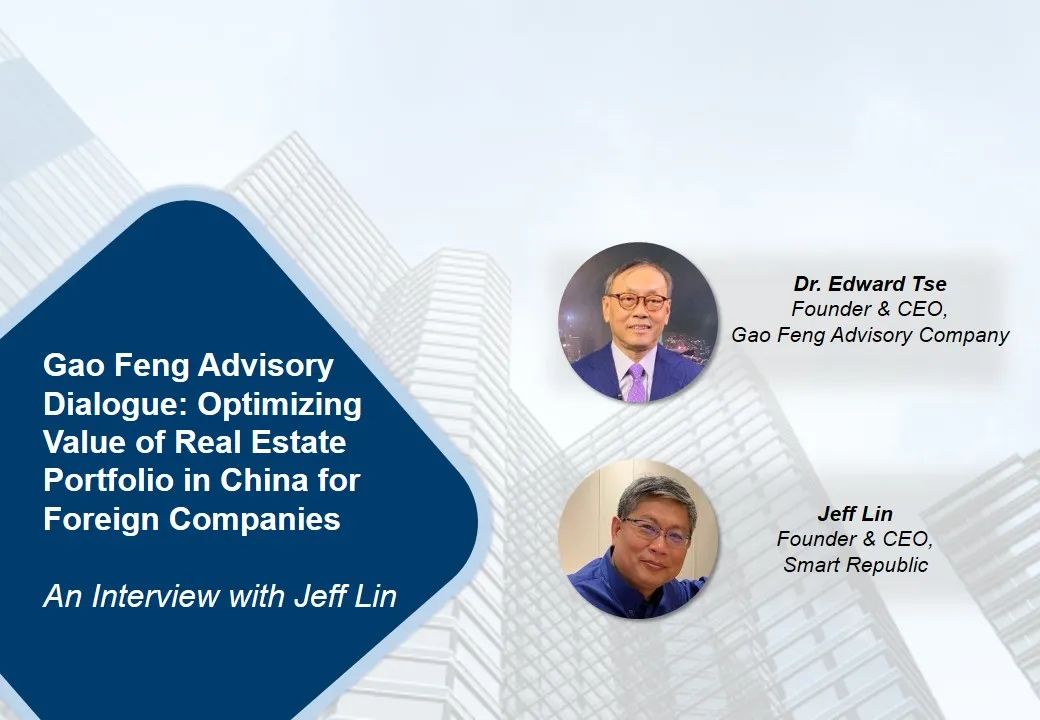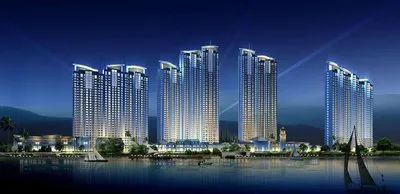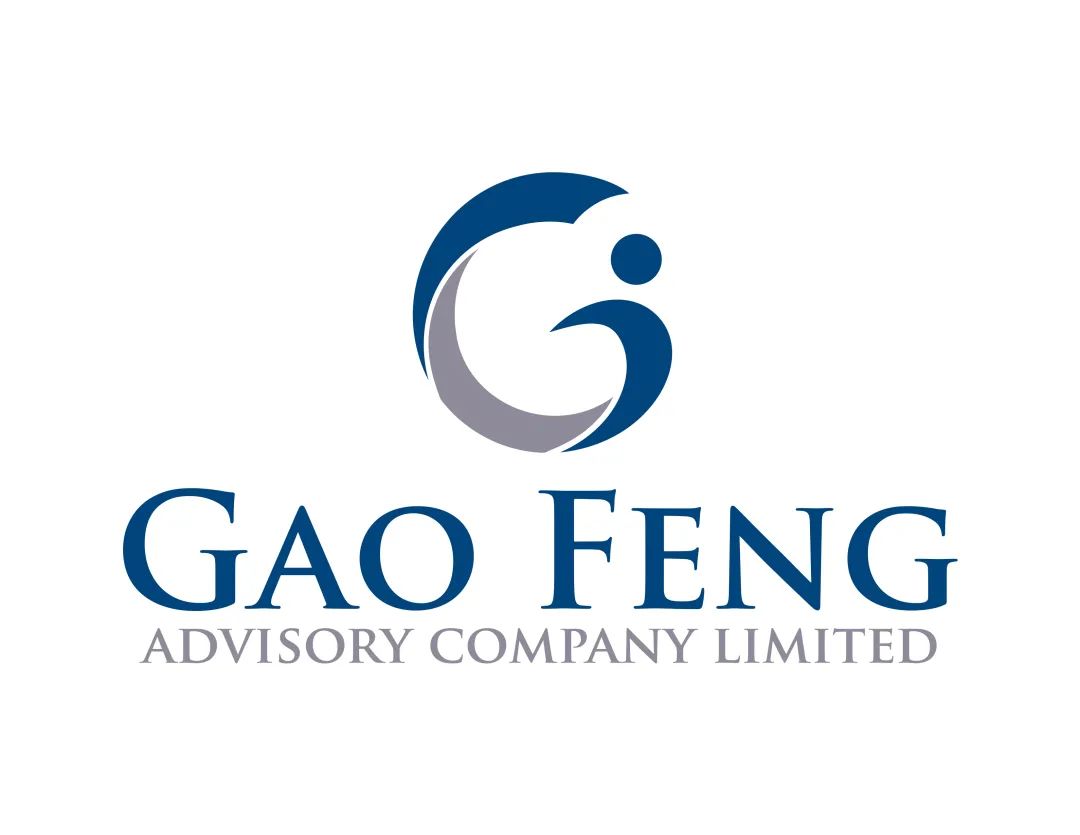GF Viewpoint | Optimizing Value of Real Estate Portfolio
Dialogue: Optimizing Value of Real Estate Portfolio in China for Foreign Companies

By Edward Tse and Jeff Lin
September 2021
A recent Gao Feng Advisory Viewpoint documenting a dialogue between Dr. Tse, CEO at Gao Feng Advisory and Jeff Lin, CEO at Smart Republic and Managing Director at Gao Feng Advisory on real estate portfolio on August 5.
In this dialogue, they discussed on how foreign companies should optimize the value of their real estate portfolio in China and our hands-on experience in helping clients on this and related issues.
Ed Tse: Jeff, I think your experience in strategy consulting and your real hands-on experience together constitute a very unique background. You are certainly well equipped to help companies sharpen their real estate strategies. We have noticed that many more multinational corporations (MNCs) are adjusting their real estate strategies. At a macro level, what kind of advice would you like to give them?
Jeff Lin: In China, over the past few decades, many MNCs have benefited from the sterling growth of the Chinese economy. These companies have generally positioned their China strategies as important components of their global strategies. I think now is a challenging time, not only to China, but also to the world. It is also a time for us, as well as the MNCs, to rethink what the China strategy of a MNC is really about. In this context, a lot of companies are used to the asset-heavy approach. It is well known that real estate properties have appreciated significantly in China. However, besides the monetary value of properties, it is also very important to consider the strategic value of a real estate portfolio to a corporate strategy.
Ed: Jeff, I think many of our clients may not be fully exploiting the value of the real estate they currently own. They haven't really tried to figure out what the strategy should be, going forward, for their existing real estate portfolios. They can perhaps think about ways to divest some or all of their real estate holdings. For example, those who would like to continue to invest in China should perhaps find other places where they can make new investments. And in some other cases, they can also collaborate with local governments and other entities, which can help them formulate a new real estate strategy more suitable for the changing macro-economic scenario. Could you perhaps quickly articulate this opportunity for our clients?
Jeff: A lot of companies aren’t looking for an entry strategy any more. Now they are thinking more about strategies to access the growing China market or a China renaissance strategy because that is how they can find ways to do better in China. More precisely, a lot of companies are thinking about the valuation of their properties only, whereas our advice to them is that they should not examine only the buy and sell aspects and how to cash out. Rather, they should think of harvesting the true value of their properties. An important aspect in this context is the need for a strategy which helps you rationalize the positioning of your real estate portfolio. Some of the property investments may have been at the right place within the ecosystem at the time of investment, but the locations might have developed and become too urban.
A piece or parcel of land may be in a very prosperous area by default, but whether it would be desirable to further expand operations at the same location may warrant deep analysis. Expansion of an existing factory or facility may be preferred by the government but one also needs to figure out ways to be a good corporate citizen and adhere to Chinese policies, determine what and who to cooperate with and take into consideration the overall direction of development in China. This should be viewed as an ecosystem issue, with the need for taking a strategic view on it. Our view is that companies need to think how to rationalize their real estate portfolios and update their strategies in tune with the changing scenarios at the macro level. That's a very important issue for one to consider.
Ed: We help clients to formulate strategies that can help them work better, in unison with the local governments. The idea is to ensure that the piece of land currently owned can ultimately command the value it deserves. So perhaps you can explain how that process works, and how we can actually help our clients to exploit the full value of their real estate assets.
Jeff:These clients are MNCs and industry players. They benefit from real estate appreciation, but they don't really understand what real estate strategy shall work here in China. We have to evaluate their overall China strategy and ensure that real estate strategy is in sync with the overall strategy. In particular, supply chain management has to be considered. A systematic rethink on strategy is required.

Source: Baidu
We can provide them with several options, taking into consideration the current policy constraints. We can also help them anticipate near-term approach and attitudes of policy makers and government officials, on how they would be further developing the city or region. Understanding what their key performance indicators are, and what the "unmet" development needs of specific regions are from the government’s point of view is important for companies. Therefore, after going through this process, we often find that there are different strategic options under different interpretations of the current and future direction of policies in different regions and cities. In conclusion, we can draw and develop strategic plans for clients to spell out what they can do, not just regarding the land they own and its price, but also actions for overall growth and development.
One possibility that companies need to consider is to co-develop land with a real estate developer, which will likely take a longer time, but can yield a lot of potential profit in the longer term. In the end, they need to equip themselves to make decisions after being mindful of the government perspective. We can help them to develop plans for better utilization of the land which could be classified as an industrial zone.
We have to maintain good communications with the government and also with many real estate developers since we have to manage any risks of rezoning due to government development plans. In the end, everyone will likely win, to create a win-win scenario. We not only help them plan from the beginning stage, working on all strategic options for corporate strategies, but also to help them with implementation of strategies, including finding and also screening potential buyers to complete the whole deal and the process. We position it as a result-oriented project.
Ed: Jeff, how does one put together a team or an ecosystem in China? In this case, both sides can participate in formulation of a new real estate strategy and perhaps you can share with us some of your experiences in doing this.
Jeff: I think smart cities are smart not only in terms of technology, but also about what is the right way for people to live, work, learn, and have fun in a reasonable sense. It's also an important strategic approach to discuss things with the government. It not only gives you land for an industrial purpose, but also how you can make the city, your employees, and also your neighbors benefit from your growth and development.
I think this is a very important aspect to think about when expanding a China real estate portfolio. It is very important to think about not only industrial purposes, but also about how you can make your employees and your ecosystem partners, particularly your community neighbors, benefit from your growth, which will lead to better reception from government officials to your strategic plans.
Ed: Every local government wants to pick a certain strategic position for itself because they also want to compete with peers. So, every local government is trying to identify its own areas of strength and to build new strengths along the way. They look for many companies, both local Chinese companies, and in many cases also foreign companies who can bring in this value, when considering new partnerships or ecosystems, and how they could really drive something well together.
One needs to have an idea about how to work with certain local governments, for creating a joint agenda together, so that both sides can benefit along the way. It is kind of a multi-dimensional way of thinking about a city or a multi-dimensional way of thinking about the way of living. Creating this win-win situation would be a very good way for many companies to think when going forward in real estate strategies.
Jeff: In addition to working with the government, sometimes it's also very important to smartly work with rest estate developers who can also help. Real estate developers may also benefit by working out a win-win situation as they contribute to your strategic plans. How to consider everyone's strategic needs, their KPIs and go through a non-zero sum game approach for creating win-win scenarios is the key. Those are the new strategies for MNCs in China, through real estate at a strategic level.
About the Author
Dr. Edward Tse is founder and CEO, Gao Feng Advisory Company, a founding Governor of Hong Kong Institution for International Finance, Adjunct Professor of School of Business Administration at Chinese University of Hong Kong , Professor of Managerial Practice at Cheung Kong Graduate School of Business and Member of Advisory Board, Institute for China Business and HKU SPACE Executive Academy. One of the pioneers in China’s management consulting industry, he built and ran the Greater China operations of two leading international management consulting firms (BCG and Booz) for a period of 20 years. He has consulted to hundreds of companies, investors, start-ups, and public-sector organizations (both headquartered in and outside of China) on all critical aspects of business in China and China for the world. He also consulted to a number of Chinese local governments on strategies, state-owned enterprise reform and Chinese companies going overseas, as well as to the World Bank and the Asian Development Bank. He is the author of several hundred articles and five books including both award-winning The China Strategy (2010) and China’s Disruptors (2015), as well as 《竞争新边界》 (The New Frontier of Competition), which was co-authored with Yu Huang (2020). He holds a SM and s SB in Civil Engineering from the Massachusetts Institute of Technology, as well as a PhD and an MBA from University of California, Berkeley.
Jeff Lin is President at Smart Republic and Managing Director at Gao Feng Advisory Company based in Taiwan and Shanghai. He has over 20 years of strategy consulting experience, continuously working as a corporate strategy consultant for both Chinese and multinational corporations, including Haier and Cisco. Currently he focuses on convergence of high tech and real estate by developing smart lifestyle applications and smart cities of the future.


Gao Feng Advisory
Gao Feng Advisory Company is a professional strategy and management consulting firm with roots in China coupled with global vision, capabilities, and a broad resources network
Wechat Official Account:Gaofengadv
Shanghai Office
Tel: +86 021-63339611
Fax: +86 021-63267808
Hong Kong Office
Tel: +852 39598856
Fax: +852 25883499
Beijing Office
Tel: +86 010-84418422
Fax: +86 010-84418423
E-Mail: info@gaofengadv.com
Website: www.gaofengadv.com
Weibo: 高风咨询公司
